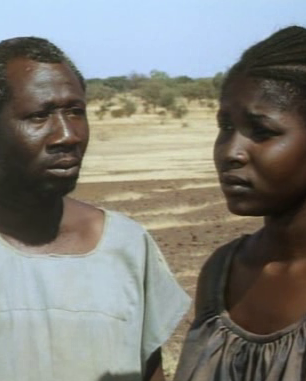Friday June 28, 1991.
TILAÏ (The Law). Music by Abdullah Ibrahim. Written, produced and directed by Idrissa Ouedraogo. Running time: 81 minutes. Rated Mature with the warning "occasional violence." In the More (Mossi) language with English subtitles.
IT WAS NOT THE homecoming that Saga (Rasmané Ouédraogo) had expected.
There is an unexpected tension in the sub-Saharan air as his brother comes forth to greet him. Kougri (Assane Ouedraogo) looks wary and uneasy.
"What happened after I left?" Saga asks.
"Nothing," Kougri says. "Nothing at all."
Feature films from Burkina Faso are nothing if not unexpected. Tilaï, written, produced and directed by Idrissa Ouedraogo, is certainly the first to be commercially released in Vancouver.
In 1954, the year of Ouedraogo' s birth, Burkina Faso was still known as Upper Volta. A former French colony, the landlocked West African nation remains one of the world's poorest countries.
Such disadvantages notwithstanding, Ouedraogo set out to become a filmmaker, making his directorial debut in 1981. A graduate of the Sorbonne's film program, he made the move from documentary shorts to fictional features in 1986.
To produce Tilaï, his third feature, he put together a deal involving local African, French and Swiss investors. Even so, it is an entirely indigenous domestic drama, a story of conflicting duties set in the tradition-bound Mossi countryside.
Returning to his village after a two-year absence, Saga discovers that his father, Nomenaba (Seydou Ouédraogo), has married Nogma (Ina Cissé), the young woman who was promised to him.
Local custom, it appears, allows men more than one wife, and Nomenaba has sidelined Saga's still-living mother Koudpoko (Mariam Ouédraogo). The older man, it seems, is within his rights appropriating his son's bride-to-be.
Saga is expected to "understand." Unfortunately for all concerned, the attraction between Saga and Nogma will not be denied.
Ignoring tilaï — "the law" — the young lovers begin a passionate affair, a relationship that can only bring dishonour upon both families.
Flawlessly crafted, Ouedraogo's picture takes us into an unfamiliar world of subsistence farmers and goatherds to examine some age-old generational conflicts. Though its setting is remote, the emotions that it explores are universal.
Tilaï is an intense slice of life from an unexpected source.
The above is a restored version of a Province review by Michael Walsh originally published in 1991. For additional information on this archived material, please visit my FAQ.
Afterword: I first became aware of the existence of Burkina Faso in late September, 1989. It happened in a movie theatre. The picture on the screen was director Denys Arcand’s brilliant Jésus de Montréal, during which the title character (an actor playing the Christ in the annual Eastertide Passion Play) muses on how his life might have turned out “if I had been born in Burkina Faso.” Two years later, I had the opportunity to sample the work of an actual Burkinabé filmmaker, Idrissa Ouedraogo.
Tilaï, winner of the Grand Prix at the 1990 Cannes International Film Festival, had its North American premiere at that year’s Festival of Festivals in Toronto. The following summer it was playing in Cineplex Odeon’s Royal Centre theatre in downtown Vancouver. The very existence of Burkinabé cinema prompted a whole lot of questions. I found myself wondering what to make of the cultural priorities left behind by Africa’s former European colonizers. Today, film scholars consider francophone Burkina Faso’s cinema among the continent’s most significant. It should be noted that Ouedraogo, a major contributor to that fame, learned his craft at film schools in the U.S.S.R. and France. In 1969, his otherwise impoverished nation (with a population of 21 million) founded the biennial Pan-African Film and Television Festival, today recognized as the continent’s largest such event.
And here’s one more fun fact. Director Ouedraogo’s second feature film, 1989’s Yaaba (Grandmother), received a “Commendation” from the Ecumenical Jury at the 42nd Cannes Festival. The prize that year went to Arcand’s Jésus de Montréal.
